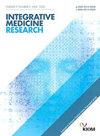探索脑机接口与传统医学、补充医学和综合医学的交叉点
IF 3
4区 医学
Q2 INTEGRATIVE & COMPLEMENTARY MEDICINE
引用次数: 0
摘要
脑机接口(bci)代表了医疗保健领域的变革性创新,实现了大脑和外部设备之间的直接通信。这篇教育性文章探讨了脑机接口与传统、补充和综合医学(TCIM)的潜在交集。脑机接口在增强冥想等身心练习方面显示出了希望,而它们与能量疗法的结合可能会带来新的见解和可衡量的结果。新兴的进步,包括人工智能增强的脑机接口,有可能改善个性化和扩大TCIM干预的治疗效果。尽管有这些机会,但是将bci与TCIM集成在一起会带来相当大的伦理、文化和实践方面的挑战。必须解决与知情同意、文化敏感性、数据隐私、可访问性和监管框架相关的问题,以确保负责任的实施。相关利益相关者(包括TCIM和传统从业人员、研究人员以及其他相关利益相关者中的政策制定者)之间的跨学科合作对于开发综合医疗保健模式至关重要,这种模式可以平衡创新与患者安全和尊重不同的治疗传统。未来的方向包括扩大证据基础,通过bci增强研究来验证TCIM的实践,促进公平获取神经技术进步,并促进全球道德准则,以应对复杂的社会文化动态。脑机接口有可能彻底改变TCIM,为复杂的健康挑战提供新颖的解决方案,并促进更包容、更综合的医疗保健方法,只要它们得到负责任和合乎道德的使用。本文章由计算机程序翻译,如有差异,请以英文原文为准。
Exploring the intersection of brain-computer interfaces and traditional, complementary, and integrative medicine
Brain-computer interfaces (BCIs) represent a transformative innovation in healthcare, enabling direct communication between the brain and external devices. This educational article explores the potential intersection of BCIs and traditional, complementary, and integrative medicine (TCIM). BCIs have shown promise in enhancing mind-body practices such as meditation, while their integration with energy-based therapies may offer novel insights and measurable outcomes. Emerging advancements, including artificial intelligence-enhanced BCIs, hold potential for improving personalization and expanding the therapeutic efficacy of TCIM interventions. Despite these opportunities, integrating BCIs with TCIM presents considerable ethical, cultural, and practical challenges. Concerns related to informed consent, cultural sensitivity, data privacy, accessibility, and regulatory frameworks must be addressed to ensure responsible implementation. Interdisciplinary collaboration among relevant stakeholders, including TCIM and conventional practitioners, researchers, and policymakers among other relevant stakeholders is crucial for developing integrative healthcare models that balance innovation with patient safety and respect for diverse healing traditions. Future directions include expanding evidence bases to validate TCIM practices through BCI-enhanced research, fostering equitable access to neurotechnological advancements, and promoting global ethical guidelines to navigate complex sociocultural dynamics. BCIs have the potential to revolutionize TCIM, offering novel solutions for complex health challenges and fostering a more inclusive, integrative approach to healthcare, provided that they are utilized responsibly and ethically.
求助全文
通过发布文献求助,成功后即可免费获取论文全文。
去求助
来源期刊

Integrative Medicine Research
Medicine-Complementary and Alternative Medicine
CiteScore
6.50
自引率
2.90%
发文量
65
审稿时长
12 weeks
期刊介绍:
Integrative Medicine Research (IMR) is a quarterly, peer-reviewed journal focused on scientific research for integrative medicine including traditional medicine (emphasis on acupuncture and herbal medicine), complementary and alternative medicine, and systems medicine. The journal includes papers on basic research, clinical research, methodology, theory, computational analysis and modelling, topical reviews, medical history, education and policy based on physiology, pathology, diagnosis and the systems approach in the field of integrative medicine.
 求助内容:
求助内容: 应助结果提醒方式:
应助结果提醒方式:


